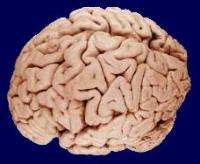In The Brain, Early-Stage Intense Passionate Love Seems To Be Universal

(PhysOrg.com) -- Close relationship researchers have previously found that Easterners (those from collectivistic cultures such as China) seem to regard love differently from Westerners (those from individualist cultures such as the United States).
However, since these studies were conducted with self-report questionnaires, are these cultural differences due to actual differences in the experience of love? Or just in cultural differences of how people talk about their experiences (e.g. cultural differences in modesty, reserve etc)? A new study published in Human Brain Mapping (online publication date: 16 April 2010) set out to clarify this issue using a non self-report method: neuroimagining via functional Magnetic Resonance Imaging (fMRI).
Xiaomeng Xu, Doctoral Candidate in Psychology and Arthur Aron, Professor of Psychology, both at Stony Brook University, with Lucy Brown at Albert Einstein College of Medicine, Guikang Cao and Tingyong Feng of Southwest University, China and Xuchu Weng of the Chinese Academy of Sciences, China, conducted the study.
The researchers looked at the brain patterns of 18 Chinese college students who had just fallen madly in love and were in the early stages of a romantic relationship. The students were placed in the scanner at the Beijing MRI Center for Brain Research and looked at alternating pictures of their romantic partner and an acquaintance they had no special feelings for (who was the same sex as their partner). The results of this study done in China were compared to results from a previous study done with American Stony Brook University students to see if there were cultural differences in brain activations for early-stage intense passionate love.
Unlike past research based on questionnaires showing cultural differences, this study found that the patterns of brain response were extremely similar for Chinese and Americans. For people intensely in love in both cultures, viewing images of the beloved elicited brain activations in the midbrain dopamine-rich reward/motivation system (a system closely related to drug addiction) including the Ventral Tegmental Area (VTA) and caudate.
The researchers also followed up on the Chinese participants 18 months after they had been in the scanner to investigate whether brain activations during the “madly in love” stage of the relationship predicted relationship satisfaction as the relationship developed over time. Activations in specific brain areas known to be associated with reward/pleasant feelings ( in the subgenual and superior frontal gyrus) substantially predicted greater relationships satisfaction 18 months later. This is the first neuroimaging study of love to examine follow-up data.















